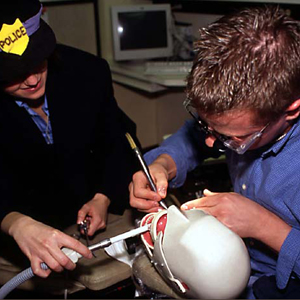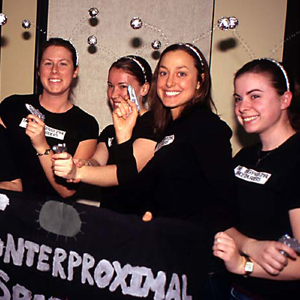 |
|---|
| Dentistry students concentrate during a competition held during the ´Prosthodontic Olympics.´ The event was developed by Dr. Bob Loney as an opportunity for dentistry students to improve their speed in clinical and laboratory procedures. |
In many curricula, emphasis is often placed on students´ quality of work, with minimal incentive or credit provided for the speed with which acceptable results are achieved. The ´Prosthodontic Olympics´ was developed by Dr. Bob Loney of the Faculty of Dentistry to provide an opportunity for second year dental students to improve their speed in performing clinical and laboratory procedures. The emphasis is on having fun, learning, and improving one´s proficiency.
The Prosthodontic Olympics consists of five events including procedures such as making dental impressions, preparing a tooth for a crown, and making a temporary crown. Most procedures are performed on mannequins or models.
Students work in teams to select names and dress in costume for the games. Each student participates in one event. Prizes worth over $5,000 are donated by dental companies and awarded to gold, silver and bronze medalists. A grand prize is awarded to a member of the team with the highest score, as an incentive for teams to work together, and cheer each other on. Class is cancelled on the morning of the Olympics, and there is a boisterous opening ceremony that includes lighting an ´Olympic´ flame and team introductions.
Material and models are provided several weeks prior to the Olympics in order for students to practice. Students have a formal practice session one week prior to the Olympics, so that faculty mentors can provide feedback to help students improve their speed and quality of work. Faculty have noted, at times, that students seem more willing to practice for the ´Olympics´ than they might for their class assignments.
 |
|---|
| Competitors really got into the team spirit during the ´Prosthodontic Olympics.´ |
Criteria are defined for each event and points are awarded for both speed and quality for only those products that are acceptable in quality. The student with the greatest cumulative score for quality and speed wins the event. When ties occur, the student with the highest quality wins. World record times are kept from year to year so students can compare their performance to those of others. Full and part-time faculty grade products together, thereby providing an informal calibration opportunity.
Student feedback about the Olympics has been extremely positive. One student course evaluation contained the comment, "My favorite day of the whole year was the ´Prosth´s Olympics´". A competition such as the Prosthodontic Olympics can improve student proficiency with minimal demands on curricular time. Student feedback has been extremely positive. Instructors have noted increased efficiency in clinics. Graduates have noted that they use procedures that they once thought were too time-intensive, because they realize that they can perform them with reasonable efficiency.
Winning times for this year´s events are listed below. Congratulations to the Champions!
